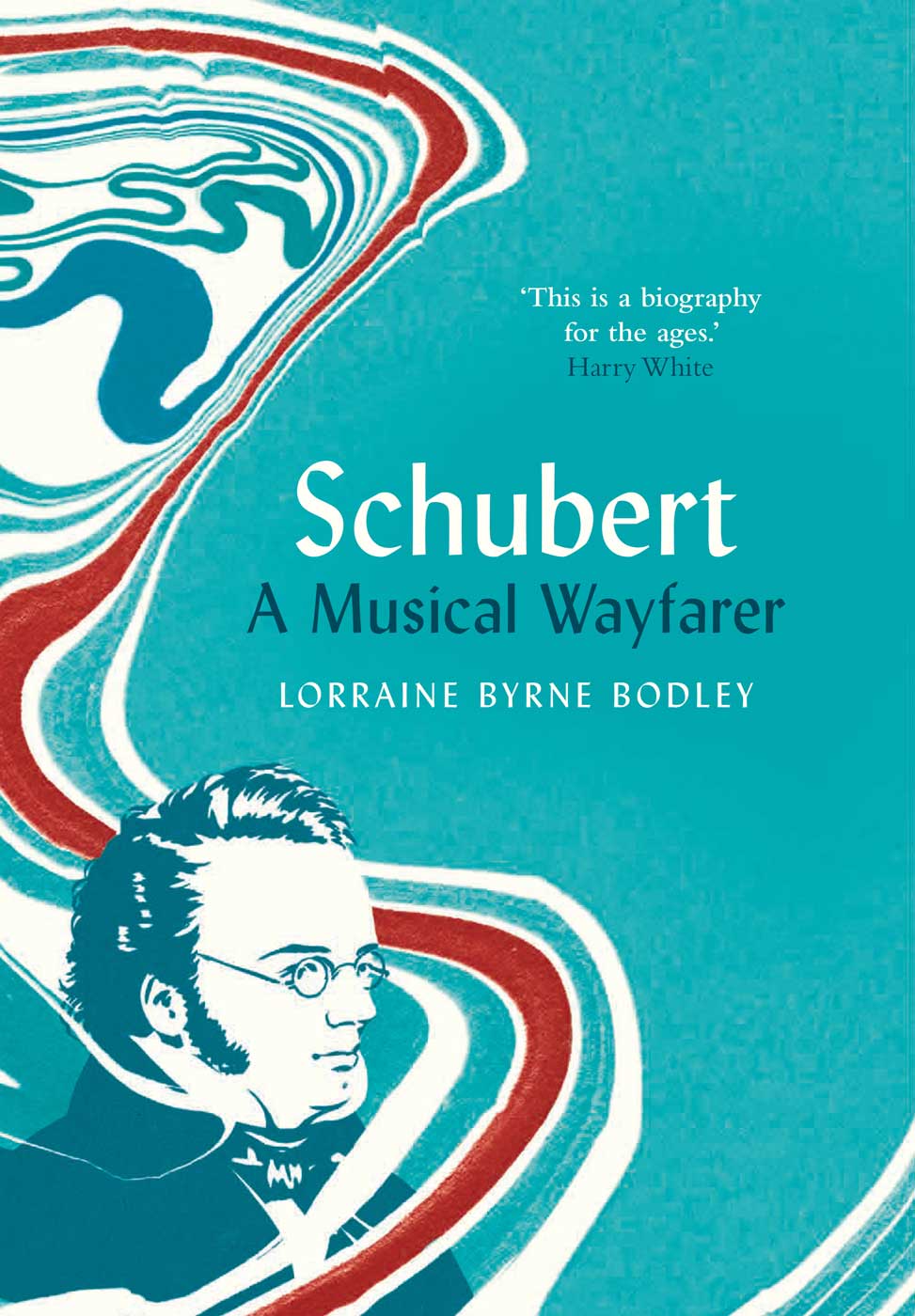
SCHUBERT. A MUSICAL WAYFARER
Awarded the Jean-Pierre Barricelli Prize for the Best Book on Romanticism 2023
Welcome to the companion webpage for Schubert. A Musical Wayfarer by Lorraine Byrne Bodley. Chapter by chapter, this page provides the scores to the online musical examples listed in the book, along with a description of the book below. Purchase a copy or read more about the book via Yale University Press and to the Amazon link for the reduced price and preview.
DESCRIPTION
Franz Schubert is one of a handful of European composers whose music has outworn the past two centuries. An immensely prolific artist– his catalogue exceeds one thousand works – he nevertheless struggled throughout his short life to achieve even a modicum of the success that was his due. Following his death in 1828 (at the age of 31), his symphonies, chamber music, piano music and most especially his astonishing song settings gradually became prominent in the repertory and practice of art music across the globe. But many of his masterly essays in sacred music and in other musical genres remain much less well-known to the present day.
This biography offers a fresh appraisal of Schubert’s often chaotic and turbulent private and professional life, and thereby contextualizes the singular growth of his musical imagination under the impact of family (especially his relationship with his father), friendship, sexuality and the cultural politics of early nineteenth-century Vienna. It reconsiders the structural and emotional meaning of many of Schubert’s best-known works through the agency of new research (notably in relation to the ‘Unfinished’ Symphony), and it countenances the significance of his compositions for male-voice choir, his piano duets and his persistent if unsuccessful enterprises in the opera house, among much else. Above all, it privileges Schubert’s lifelong debt to Italian compositional technique (against the grain of his more general reception as a quintessentially ‘German’ composer) at the hands of his teacher, Antonio Salieri, together with the composer’s own exceptional immersion in and response to contemporary German poetry. Schubert’s life was constantly prone to what Virginia Woolf memorably described as ‘the assault of truth’: this biography seeks to understand that life in relation to the imperishable music it nevertheless produced.

Schubert. A Musical Wayfarer
By Lorraine Byrne Bodley
Published by Yale University Press, 2023
Purchase a copy of the book:
Audio Book available, read by Christa Lewis (20 hours and 45 minutes):
Select sections have been released on Google Play Books:
ENDORSEMENTS
“With her unique combination of archival zeal, literary brilliance, meticulous knowledge of scholarly sources, and incisive musical acumen, Lorraine Byrne Bodley has produced a masterpiece: a fascinating and nuanced biography that does full justice to this complex, towering figure.”
Michael Beckerman, Carroll and Milton Petrie Professor of Music, New York University
“This is a biography for the ages. Its scholarship is oceanic, and its profoundly empathetic engagement with Schubert as man and musician is steeped in the felt life and thought of early nineteenth-century Vienna. A heroic, serenely-considered and compelling achievement.”
Harry White, Professor of Music, University College Dublin
“Lorraine Byrne Bodley is a gifted storyteller who guides the reader through Schubert’s life with deep psychological insight. This illuminating book connects the biography and the musical works of the troubled wayfarer, creating an intriguing link between the author’s life and the protagonist of his famous Winterreise.”
Andrea Lindmayr-Brandl, Professor of Music, University of Salzburg, Director of the Schubert Research Centre, Austrian Academy of Sciences
“This book is an event: Byrne Bodley slays any number of calcified myths, delves into European sources never explored before in this depth, examines life-into-art complexities with rare insight, examines Schubert’s friendships with empathetic perception, discusses his unknowable sexuality with laudable understanding, and loops back and forth between the works and biography in a way that illumines both. This book is organized for maximum ease of use and written in clear, compelling language – even her chapter titles draw in the reader – and her discussions of Schubert’s music are often revelatory. All Schubert-lovers will gain much from Byrne Bodley’s magnum opus.”
Susan Youens, Emeritus Professor of Music, University of Notre Dame
“The biography, written with empathy palpable on every page, draws a multifaceted portrait of both the man and the composer Schubert – a fascinating picture in which life and works are related to each other in many ways.”
Thomas Seedorf, President of the International Schubert Society
SAMPLE REVIEWS
Journal of Austrian Studies 58/1 (2025), 89–91 – Read in full
The New York Times, 15 April 2024 – Read in full
MusikForschung (7.2.2024);
Notes, 81/2 (2024), 324–331 – Read in full
JSMI, 2024 – Read in full
‘Lorraine Byrne Bodley has written a thoughtful biography of Schubert.’
Yale University Press, New Haven, CT/London 2023, xxxvi + 693 S. – Read in full
‘Schubert’s Unfinished Symphony was completed but bitter rival destroyed manuscript’,
Dalya Alberge, Sunday Telegraph, 17 June 2023 – Read in full
‘Forget the Schubert myth – this book reveals the real man’,
Ivan Hewitt, The Telegraph, 2 July 2023 – Read in full
‘Schubert and his friends. The Biography of a young musical genius’,
Laura Tunbridge, The Times Literary Supplement, 4 August 2023 – Read in full
Open Letters Monthly and The Washington Post, Steve Donoghue, 28 August 2023 – Read in full
The New York Times, Joshua Barone, 15 February 2024 – Read in full
MusikForschung Andreas Dorschel, 7 February 2024
The Epoch Times, Jenny Lijungkvist Norway, 16 September 2023 – Read in full
Country Life UK, Supplement to The Financial Times, Henrietta Bredin 12 July 2023
ILLUSTRATIONS
Clink on the links below to view the illustrations referenced in Schubert. A Musical Wayfarer
17 Franz Theodor’s Family Home
18 Schubert’s Diary Entry, 17 June and 8 September 1816, WB HIN 030059
19 Moritz von Schwind’s Portrait of Mayrhofer
20 Schubert’s Letter to Graz (1823)
21 Franz Theodor’s Letter to Ferdinand, 19 November 1828 and Ferdinand’s Letter to his Father, Franz Theodor, 21 November 1828
TABLES
Clink on the links below to view the tables referenced in Schubert. A Musical Wayfarer
MUSICAL EXAMPLES
Chapter by chapter, click on the links below to view the scores referenced in Schubert. A Musical Wayfarer
CHAPTER 3
3.1a Beitrag zur fünfzigjährigen Jubelfeier des Herrn von Salieri (D 407), opening, BN MS280
3.1b Beitrag zur fünfzigjährigen Jubelfeier des Herrn von Salieri (D 407), canon, bars 1–28
3.6 Fugal Sketch in B flat major (D 37A)
3.17 ‘Quell’ innocente figlio’ (D 17), WB MH47
3.18 ‘Quell’ innocente figlio’ (D 17), bars 1–4 and ‘Der Jüngling am Bache’ (D 30), bars 1–4
3.19 ‘Der Jüngling am Bache’ (D 30), WB HM3838
CHAPTER 4
4.2a Overture in D (D 12), Cantilena from bars 108ff and 281ff
4.2b String Quartet no. 2 in D major (D 94/i), bars 83–91
4.3a String Quartet in C major (D 32/iii)
4.3b Viennese Deutscher for Piano (D 128/12), bars 1–12
4.4 String Quartet in B flat major (D 36/i), bars 1–32
4.5 String Quartet in B flat major (D 68/i), bars 1–10
4.6 String Quartet in B flat major (D 68/iv), bars 1–12, rondo theme
4.8 String Quartet in D major (D 74/iv), bars 1–25
4.12 Symphony no. 1 in D major (D 82/iv), bars 1–35
CHAPTER 5
5.1 String Quartet in E flat major (D 87/i), bars 1–27
5.3a ‘Die Befreier Europas in Paris’ (D 104), first version, WB MH68
5.3b ‘Die Befreier Europas in Paris’ (D 104), third version, WB MH68
CHAPTER 6
6.1 Salve Regina in F major (D 27), soprano solo with clarinet obbligato, 183–214
6.2 Salve Regina in B flat major (D 106), tenor solo, bars 1–15
6.4 Salve Regina in B flat major SATB (D 386), bars 1–34
CHAPTER 7
7.1 ‘Gretchen am Spinnrade’ (D 118)
CHAPTER 8
8.1 Claudine von Villa Bella (D 239), Overture, bars 1–8
8.2 Claudine von Villa Bella (D 239), Overture, bars 20–8
8.3 Claudine von Villa Bella (D 239/v), ‘Es erhebt sich eine Stimme’, bars 1–42
CHAPTER 9
9.2 Symphony no. 4 in C minor (D 417/ii), transition theme, bars 94–103
9.7 Symphony in D major (D 615), WB MH189
CHAPTER 11
11.1 ‘An die Musik’ (D 547), BN, MS294
11.2 Vogl, ‘Lied der Desdemona’, opening bars 1–12
CHAPTER 12
12.1a 36 Originaltänze (D 365), WB, MH1864
12.5 Gallop in C major (D 925), bars 1–24
12.6 Cotillion in E flat major (D 976), bars 1–24
12.7a Josef Hüttenbrenner, ‘Tanz der Furien’
12.7b Teutscher für Josef Hüttenbrenner (D 643)
12.8a Folk tropes in Schubert’s Ländler (D 980 B)
12.8b Deutscher Tanz (D 365/36)
12.8c Valses sentimentales (D 779/12 and 13)
12.9a Folksongs in Schubert’s Dances (D 146/5)
12.9b Folksongs in Schubert’s Dances (D 529/8)
12.10 Trio from Deutsche (D 146/9), bars 1–8
CHAPTER 14
14.2 ‘Gesang der Geister über den Wassern’ (D 714), bars 1–15
CHAPTER 15
15.1 ‘Sei mir gegrüsst’ (D 741), bars 1–28
CHAPTER 16
16.1 ‘Gebet’ (D 815), soprano solo, bars 27–39
CHAPTER 17
17.1e Salieri, Partimento for Schubert D 25 (no III in Original Exercise, WB MH14421)
17.2 Symphony no. 7 (D 759), first movement development, bars 114–50
CHAPTER 18
18.1 ‘Wer nie sein Brot mit Tränen aß’ (D 478/2), op. 12/2
CHAPTER 19
19.1 Schubert’s first composition, Fantasy in G major for Piano Four Hands (D 1, 1810) MH16237
19.2 Trio (B section) from Polonaise (D 824/3), bars 13–20
19.3 March Militaire (D 733/1), bars 1–22
CHAPTER 20
20.2a Symphony no. 8 (D 944/ii), first subject, bars 8–16
20.2b Symphony no. 8 (D 944/ii), second subject, bars 93–97
20.5 String Quartet no. 15 in G major (D 887/i), bars 414–29
CHAPTER 22
22.1 ‘Der Leiermann’ (D 911/24)
22.2 ‘Il traditor deluso’ (D 902/2), op. 83/2, bars 1–51
CHAPTER 23
23.1a Quintet in C major (D 956/ii), first subject, bar 1–25

ACKNOWLEDGEMENTS
This website could not have been realized without the wholehearted support of the National University of Ireland, Maynooth University, Cathal Twomey, Frances Marshall and Sophie Light at Marshall Light Studio, London. My debt to many individuals is outlined in the Acknowledgements of Schubert. A Musical Wayfarer.

